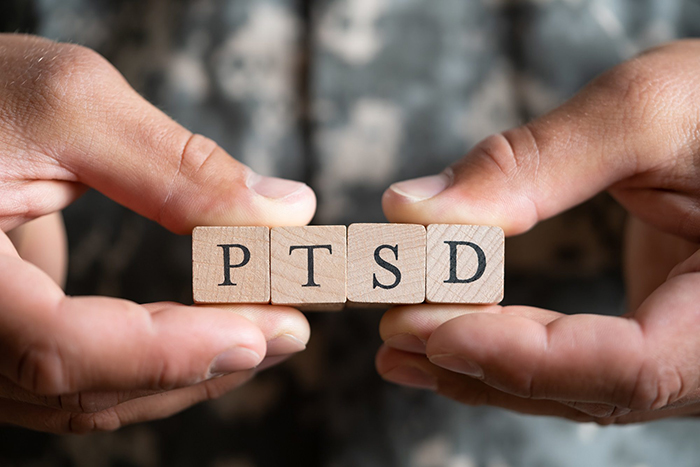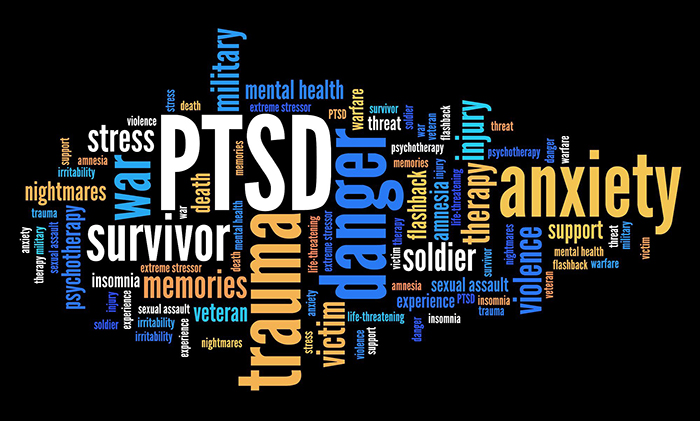“Virtual reality” often conjures images of video games and simulations or digital worlds in science fiction stories, but it’s also a tool that can be used in therapy. At Emory Healthcare Veterans Program (EHVP), virtual reality (VR) simulations are a part of treating veterans with post-traumatic stress disorder (PTSD)– and it’s where the connection between VR and exposure therapy was pioneered.

Dr. Barbara Rothbaum, EHVP’s executive director, began working with VR to treat psychological disorders in 1993. Traditionally, exposure therapy is a technique that helps patients confront their fears by facing them in real life in a therapeutic environment. A patient with a fear of heights, for example, may ride in an elevator along with his/her therapist. By using VR, the therapist can create a virtual world rather than requiring that the patient go to a physical location.
Dr. Rothbaum’s work in designing virtual alternatives for traditional therapy began with a study that used VR to assist patients in overcoming their fears of heights. In an interview with Smithsonian, she recalled the early days of the study and how her phone rang off the hook once the study was published in the American Journal of Psychiatry. Her study, the first-ever published controlled VR experiment, presented VR in a whole new light.
Smithsonian featured Dr. Rothbaum for her work in bringing VR technology to the mental health care space. Nearly 30 years after her pioneering study, VR has been applied to treatments for anxiety disorders, depression, addiction, pain, ADHD, autism, Alzheimer’s disease, traumatic brain injury, stroke, and more.
Dr. Rothbaum is recognized as the world’s leading authority on PTSD treatment utilizing VR exposure therapy, and the International Society of Traumatic Stress Studies recently honored her contributions to the field by naming her the 2021 Lifetime Achievement Award recipient.
“I’m a believer in the resilience of the human spirit,” said Dr. Rothbaum in an interview with the Atlanta Jewish Times about her Lifetime Achievement Award. “I have seen people who have been through horrific experiences and, you think, how can someone get over this? And then they do. We have good treatments, and we can make them even better. I always want there to be a message of hope.”
Emory Healthcare Veterans Program uses VR in exposure therapy to treat veterans and service members struggling with invisible wounds like PTSD. In exposure therapy, therapists help patients confront reminders of traumatic events in a therapeutic manner so that their distress and symptoms decrease.
 Although facing traumatic memories head-on might seem intimidating, revisiting the trauma is the best way to heal it. However, recalling the memory is sometimes difficult because it has been locked away for so long. In these instances, VR is very helpful. In exposure therapy, VR immerses the patient in a virtual world reminiscent of the traumatic memory. As the patient describes his/her memory to the therapist, VR allows the therapist to recreate scenes of the memory, complete with smells, vibrations, and landscapes. Through these sessions, the patient can more easily process the traumatic event while feeling safe.
Although facing traumatic memories head-on might seem intimidating, revisiting the trauma is the best way to heal it. However, recalling the memory is sometimes difficult because it has been locked away for so long. In these instances, VR is very helpful. In exposure therapy, VR immerses the patient in a virtual world reminiscent of the traumatic memory. As the patient describes his/her memory to the therapist, VR allows the therapist to recreate scenes of the memory, complete with smells, vibrations, and landscapes. Through these sessions, the patient can more easily process the traumatic event while feeling safe.
The first time Dr. Rothbaum and her colleagues offered VR exposure therapy to PTSD patients, it was with Vietnam veterans in the late 1990s. “We wanted to see if VR would have anything to offer our patients, and it did. They got better,” said Dr. Rothbaum. “They’ve reported that it didn’t bother them anymore, these experiences that had been haunting them for decades.”
About Emory Healthcare Veterans Program
Emory Healthcare Veterans Program treats conditions such as post-traumatic stress disorder (PTSD), traumatic brain injury (TBI), military sexual trauma (MST), anxiety, and depression related to military service. Treatment is free and confidential for eligible post-9/11 veterans and service members living anywhere in the United States, regardless of discharge status, deployment history, or length of service. EHVP’s two-week Intensive Outpatient Program as well as its traditional outpatient therapy is offered in-person at our clinic in Atlanta, Georgia, or via telehealth in participating states.
Treatment works, and we are here to help. Call 888-514-5345 or complete the confidential online form to learn more.




